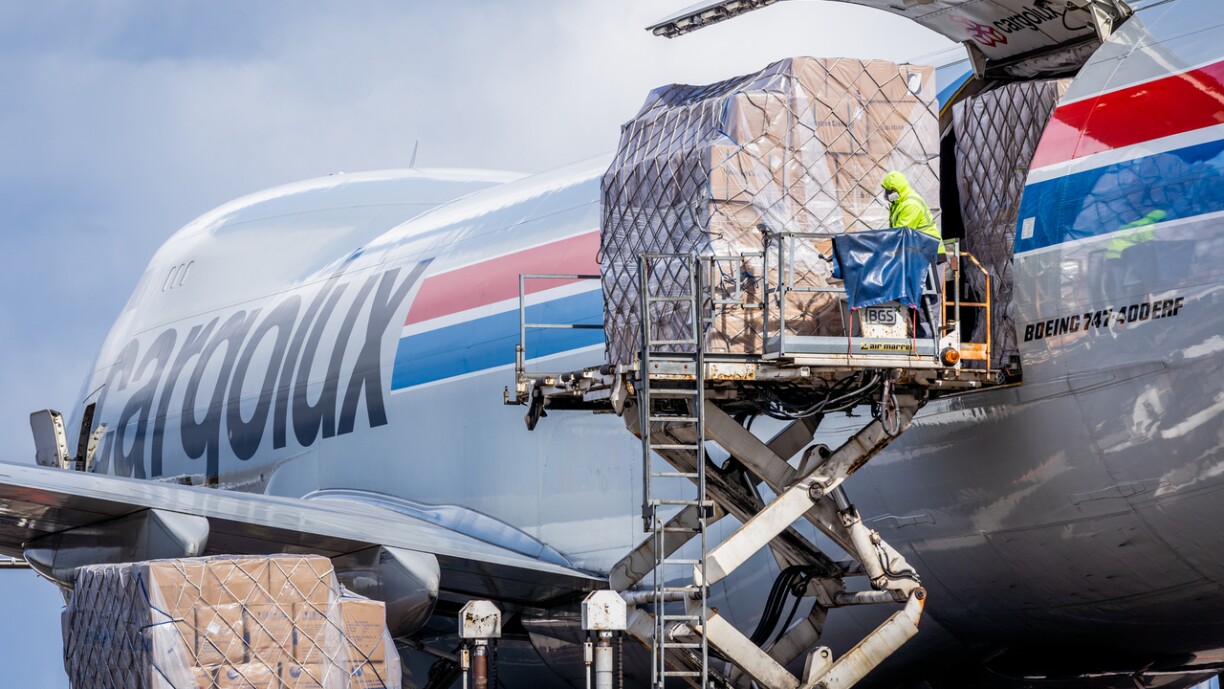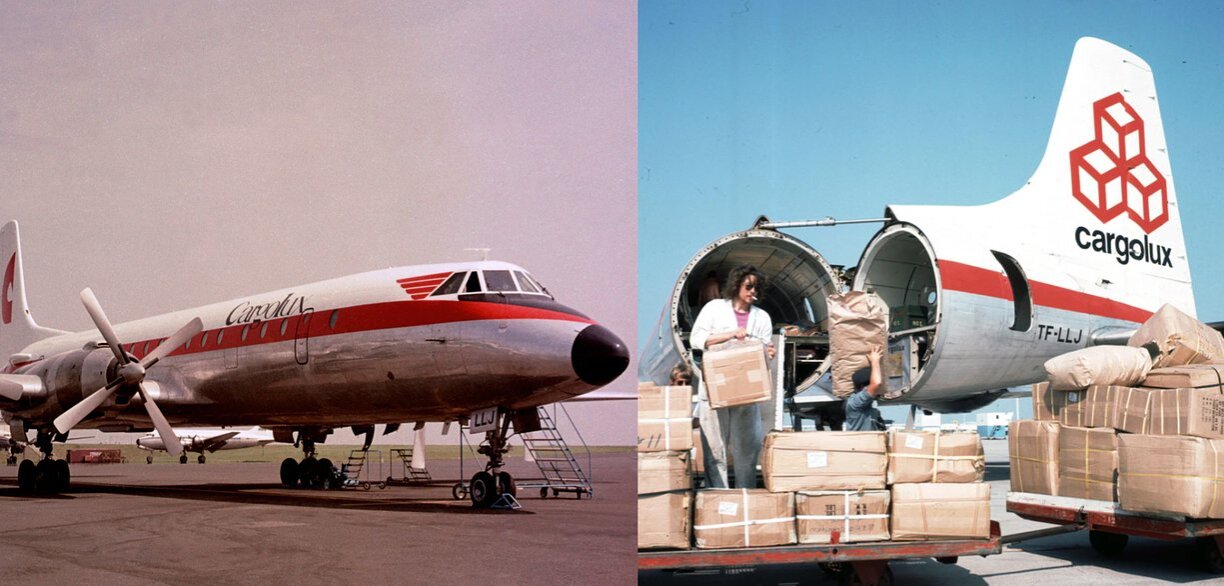
The strike, initiated on Thursday by the Luxembourg Confederation of Christian Trade Unions (LCGB) and the Independent Luxembourg Trade Union Confederation (OGBL), drew significant participation. According to information obtained by RTL, more than 700 workers gathered outside the company’s headquarters on Thursday afternoon.
On Friday, the entirety of Cargolux’s fleet, consisting of 26 aircraft, will stay out of operation. For the time being, the situation seems to be at a standstill. This strike, marking the first in the cargo airline’s 50-year history, incurs a substantial cost for the company, amounting to $25,000 per hour, per plane.
Paul de Araujo of the LCGB expressed his satisfaction with the ongoing strike in an interview with our colleagues from RTL.lu on Friday morning, stating that it had achieved remarkable participation from both pilots and technical staff.
According to de Araujo, Cargolux planes are grounded across the globe on Friday, “including in Luxembourg City, Baku, Bahrain, Dubai, Hong Kong, Anchorage, Chicago, Houston, and Mexico City.”
As early as 7.30am, an assembly of approximately 80 to 100 employees had congregated outside the company’s headquarters. The LCGB representative stressed that the workers are determined to strike until a solution is found.
De Araujo conveyed the “disappointment and shock” felt by Cargolux employees regarding the management’s actions. The disclosure of bonus payments and the alleged mention of pilot salaries in talks with journalists risk stirring up “social envy,” criticised de Araujo. He also pointed out that while the Cargolux CEO has released this information to the public, Richard Forson has not disclosed what he himself received as bonus payments.
The LCGB representative stated that the trade unions are “always open to find a resolution,” but added that they insist on the fulfilment of all of their demands.
The recent social conflict at Cargolux has found its way into discussions within the government council, although only Minister for Mobility François Bausch has chosen to comment on the matter. In keeping with previous positions, Bausch reiterated the government’s stance of refraining from direct involvement in ongoing labour disputes. Instead, the government’s role, as outlined by Bausch, is to facilitate dialogue between the concerned parties.
Minister Bausch clarified, stating, “I believe we are dealing with a situation within a private company, even if it’s true that the Luxembourg state is a shareholder. […] As is customary, the government refrains from direct interference in such matters.” Bausch stressed that the government naturally desires “a swift resolution to this social conflict,” adding that he personally hopes “Cargolux and the trade unions […] can mutually find a resolution.”
When questioned about the threat of a similar scenario at Luxair, where the state is also a shareholder, Minister Bausch stated that he would not comment on the matter. He acknowledged that during social conflicts, statements often emerge “from both sides” but underscored his decision not to engage in this particular discourse.
The fundamental disagreement is around compensation. A critical disagreement is found in the structure of planned pay increases. While Cargolux has offered a 5% scheduled salary increase spread over five years, the unions are demanding 6% over the course of four years.
Meanwhile the CEO of Cargolux, Richard Forson, has stated that the unions’ demands are “not reasonable.” In countering the unions’ position, Forson and Cargolux highlighted that employees received approximately €85,000 on an individual basis last year, with the figure rising to €200,000 over the course of three years. This as part of the company’s profit-sharing incentive.
This argument was not well-received by unions, however, who asserted that bonuses are not a fixed component of the salary structure and therefore cannot be held in comparison to their demands. Instead, they highlighted that salaries remained largely stagnant between 2003 and 2019. Furthermore, Paul de Araujo of LCGB noted that forthcoming investments make future bonuses uncertain.
But bonuses are not the only source of contention between the employer and unions. Also under discussion are wage indexations. The unions are seeking a guarantees that wage indexations will be paid out even if changes are made to the scheme by any future governments. This may be a prescient issue, as the slew of indexations has proven expensive for employers, and some indexations have been deliberately delayed to soften the blow. This has called into question, in some quarters, the continued viability of the indexation system. Forson has responded that the company will protect employees in instances of the indexation system being capped, but noted that this will not be extended to cancelled or postponed indexations.
Neither management nor the trade unions have publicly indicated any negotiations on the horizon. The strike by Cargolux employees is a result of failed negotiations pertaining to a new collective agreement.
The trade unions have declared that the current strike will be open-ended, putting pressure on the leadership of the Luxembourg-based freight company.
Meanwhile, Luxair staff appears to be resonating with these demands. On Thursday, the LCGB shared the Luxembourg Airline Pilots Association (ALPL) Luxair Division’s stance on the matter. In their press release, the pilots of Luxembourg’s flagship airline expressed “complete solidarity” with the “legitimate and justified” demands of Cargolux employees. They also pointed out “significant issues” within Luxair. Given the situation, the ALPL has decided to convene a committee meeting to determine “necessary actions.”

In 1969, the icelandic airline Loftleiðir Icelandic, also called the “The Hippie Airline” for pioneering low-cost flying offers, had already been making history by crossing the North Atlantic into Luxembourg, which became one of its top destinations in the heart of Europe. The Luxembourg government had expressed interest in collaborating with Loftleiðir Icelandic and set up a new cargo airline. Johannes Einarsson, who worked as Director of Corporate Planning for Loftleiðir Icelandic, decided to offer their surplus CL-44s as cargo aircraft to Cargolux, reconfiguring the planes that were actually used to fly passengers. But the aircraft were originally conceived as freighter and had a swing tail opening, meaning large cargo could be loaded in the back - a lot of manual work still at the time.
But funding was rather limited, and so Einarsson attempted to sell a plane in Sweden later that year. The story made headlines, and Einarsson was contacted by Swedish Christer Salén of Salén Shipping company. He was interested in partnering up with Einarsson for a smart passenger/cargo combo plan: fly Swedish tourists to Spain on the weekend, and then reconfigure the plane to bring fresh fruit and vegetables back to Sweden during the week. Einarsson dismissed the idea, arguing that it would be impossible to do both and reconfigure the planes back and forth. They were able to agree on creating a cargo-only concept, and so the joined venture Saloft was born. Both parties acquired a 50% stake in the CL-44 aircraft.
Back in Luxembourg, it was time to establish the actual airline. The Luxembourg government, Luxair, Salén, and Loftleiðir entered discussions, but while these talks were ongoing, Saloft already began operated its first flight from Luxembourg to Sao Tome with relief goods from Caritas.
1970 - After several months of discussions, Cargolux was founded on 4 March, 1970. With their one aircraft leased from Saloft, and a total of four employees and two crews, the airline set up its office on the first floor of a building on Avenue de la Liberté. It received its Air Operator Certificate on 10 May of that year, and immediately the next day it took off from Stockholk to JFK to pick up iceberg lettuce and strawberries, its historical first flight. At the end of the same year, a regular service to Hong Kong was introduced.